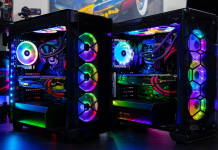Introduction
In recent years, the world of gaming has witnessed a remarkable transformation with the emergence of Web3 game development. Web3 games leverage blockchain technology and decentralized systems to create immersive gaming experiences that offer enhanced ownership, true digital assets, and play-to-earn opportunities. This article explores the future of Web3 game development and its profound impact on the gaming industry.
Understanding Web3 Game Development
Web3 game development refers to the creation of games that utilize Web3 technologies such as blockchain, decentralized finance (DeFi), and non-fungible tokens (NFTs). Unlike traditional games, Web3 games provide players with true ownership of in-game assets, allowing them to buy, sell, and trade these assets on blockchain-based marketplaces. This ownership revolutionizes the gaming experience by enabling players to monetize their time and effort spent in-game.
The Impact of Web3 Game Development on the Gaming Industry
Enhanced Ownership and True Digital Assets
Web3 game development introduces the concept of true digital asset ownership. Through the use of blockchain technology and NFTs, players have the ability to prove authenticity and scarcity of their in-game items. This newfound ownership empowers players to trade their assets freely, fostering a vibrant and decentralized economy within the gaming ecosystem.
Decentralization and Community Governance
Web3 games are built on decentralized networks, ensuring that no single entity has full control over the game. This decentralization leads to community-driven decision-making, where players have a say in the development and governance of the game. This inclusive approach strengthens the bond between developers and players, fostering a sense of ownership and loyalty.
Play-to-Earn and the Metaverse Economy
Web3 game development introduces the concept of play-to-earn, where players can earn real-world value by participating in the game. Through in-game achievements, players can accumulate rare assets or valuable resources that can be traded or sold for cryptocurrencies. This opens up new economic opportunities for players, blurring the line between gaming and real-world earnings. Additionally, Web3 games are paving the way for the development of the metaverse, a virtual universe where players can interact, trade, and socialize.
Key Technologies and Concepts in Web3 Game Development
Blockchain Technology
Blockchain technology serves as the backbone of Web3 game development. It provides a transparent and secure infrastructure for recording and verifying in-game transactions, ensuring the integrity and immutability of digital assets.
Non-Fungible Tokens (NFTs)
NFTs are unique digital assets that can represent in-game items, characters, or virtual real estate. These tokens enable players to prove ownership and authenticity, facilitating the trading and monetization of virtual assets.
Decentralized Finance (DeFi)
DeFi protocols enable the creation of decentralized marketplaces, lending platforms, and other financial services within Web3 games. Players can leverage DeFi to earn interest on their in-game assets, borrow resources, or participate in yield farming.
Interoperability and Cross-Platform Play
Web3 game development aims to break down barriers between different gaming platforms and ecosystems. Interoperability allows players to use their assets across multiple games or platforms, fostering a seamless and connected gaming experience.
The Role of Web3 Development Companies
Web3 development companies play a crucial role in the creation and advancement of Web3 games. These companies specialize in blockchain integration, smart contract development, and decentralized infrastructure. They collaborate with game developers to build secure and scalable gaming ecosystems that leverage Web3 technologies. By partnering with a web3 development company, game developers can focus on creating engaging gameplay while harnessing the power of blockchain and decentralized systems.
Challenges and Opportunities in Web3 Game Development
Scalability and Gas Fees
One of the primary challenges in Web3 game development is the scalability of blockchain networks. As more players participate in a game, the demand on the blockchain increases, leading to congestion and higher transaction fees (gas fees). Developers are actively exploring layer-2 solutions and alternative blockchains to address these scalability issues.
User Adoption and Education
Web3 games require users to understand and navigate blockchain technology, wallets, and decentralized applications (dApps). The onboarding process can be intimidating for new players, making user adoption and education crucial for the success of Web3 game development. Simplifying the user experience and providing educational resources can help bridge this knowledge gap.
Regulatory Considerations
Web3 game development operates within a rapidly evolving regulatory landscape. Developers need to navigate legal frameworks, intellectual property rights, and financial regulations associated with blockchain-based gaming. Collaborating with legal experts and staying informed about regulatory developments is essential to ensure compliance and protect the interests of players and developers.
The Future of Web3 Game Development
The future of Web3 game development holds tremendous potential for innovation and advancement in the gaming industry.
Advancements in Virtual Reality (VR) and Augmented Reality (AR)
Web3 games combined with virtual reality (VR) and augmented reality (AR) technologies offer immersive experiences that blur the boundaries between the virtual and physical worlds. Players can expect more interactive and visually captivating gaming environments, where they can explore, interact, and compete.
Integration with Artificial Intelligence (AI)
Artificial intelligence (AI) integration can enhance the gameplay experience in Web3 games. AI-powered non-player characters (NPCs) can provide more realistic and dynamic interactions, adapt to player behavior, and create personalized challenges. AI algorithms can also help developers in balancing game mechanics and optimizing the in-game economy.
Gamification of Real-World Activities
Web3 game development has the potential to extend beyond traditional gaming experiences. By integrating with real-world activities, such as fitness, education, or social impact initiatives, Web3 games can incentivize and reward players for engaging in positive behaviors. This gamification approach opens up new avenues for entertainment and personal development.
Conclusion
Web3 game development is revolutionizing the gaming industry by introducing enhanced ownership, true digital assets, and play-to-earn opportunities. As blockchain technology and decentralized systems continue to evolve, Web3 games are poised to shape the future of gaming. By leveraging key technologies, collaborating with Web3 development companies, and addressing challenges, game developers can create immersive experiences that empower players and redefine the gaming landscape.




















![TamilMV Proxy List Top 30+ [Unblock TamilMV Sites] TamilMV Proxy Unblock](https://technewsgather.com/wp-content/uploads/2023/04/17825836_SL-121019-25870-14-1-100x70.jpg)